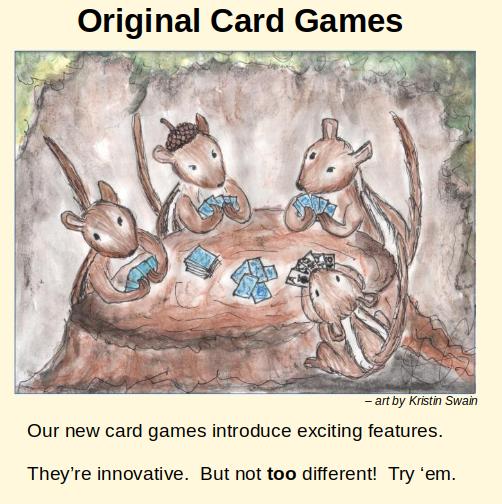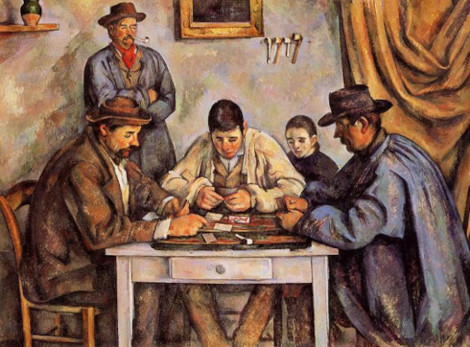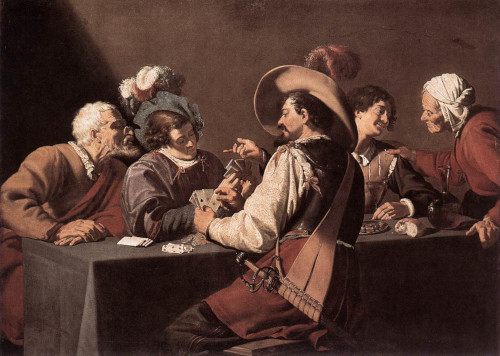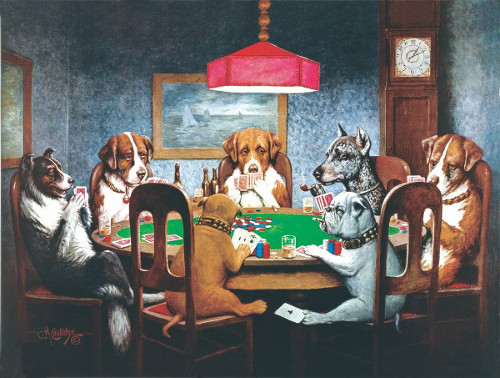 Favorites in italics:
Favorites in italics:
| Game | Players | Level | Description |
|---|---|---|---|
| Robber Rummy | 2-5 | Medium | A boisterous rummy in which you steal opponents' melds |
| Crib Rummy | 2-4 | Medium | A new card game for your cribbage board |
| Wildcat Rummy | 2-5 | Medium | A rummy where you win by going out --or-- by scoring melds to the table. Well-balanced and fun. |
| 7 Trick Avoidance Games | 3-6 | Easy | Several quick, easy trick-avoidance games. Great for ad hoc mixed groups. |
| Compendi | 3-6 | Easy | The ultimate trick avoidance game -- where you play one hand each of six quick trick-losing games. |
| Christmas Whist | 2 | Medium | Elegant trick-taking game for two |
| Klobber Nuggie | 2 | Hard | Sophisticated trick-taking game for two |
| Zique | 2 | Medium | Our own version of Bezique, one of the best ever card games for two players! |
| Pebbles and Nuts | 2-4 | Medium | You must "thread the needle" by winning valuable cards in tricks, while trying to avoid penalty cards |
| Jack Royal | 2 | Medium | A simpler one-deck version of Zique or Bezique |
Introduction to My Card Games
By Howard Fosdick © BestFreeNewGames.com
Playing cards are generic game pieces with which you can play hundreds of different games. They're flexible, inexpensive, and portable.
Most experts believe the Chinese invented playing cards in about the 9th century AD. The woodblock printing technology developed at that time made them feasible.
Over the next several centuries cards spread to middle eastern societies in Persia, Arabia, and Egypt. They didn't arrive in Europe until later; the first recorded reference to playing cards there appears in the 1300s in the Spanish peninsula.
Cards continued to evolve in both Europe and elsewhere. For example, today in English-speaking countries we assume a card deck comprises 52 cards, divided into two colours and four suits: hearts, diamonds, spades, and clubs. But this is only our standard.

Elsewhere both the composition of the deck and its suits differ. For example, in Germany decks commonly have either 32 or 36 cards divided into the suits of hearts, bells, acorns, and leaves. And in Spanish-speaking nations, most decks contain either 40 or 48 cards, split among cups, coins, clubs, and swords.
Kinds of Games
Needless to say, with such wide variety of card packs, there is an even wider variety of games. I've invented a few that attempt to combine the best of traditional card games with various new concepts and features. Here they are.
Rummy Games
Rummy games follow a set procedure. You draw a card, match up the cards in your hand, and then you discard. The goal is to mold your hand into matched sets of cards called melds.
In some rummy games, the objective is merely to match all one's cards to go out. Gin is the most famous example of this sort of rummy.
In other rummies, you play melds to the table. The goal is to score the most points by laying down the highest scoring melds.
Our first game is a scoring rummy -- but with one big twist. In Robber Rummy you can steal melds other contestants have played to the table. This can get pretty boisterous as ownership of melds can switch many times in a hand!
Our new Wildcat Rummy combines goals. You can win either by going out --or-- by scoring the most table points. The key lies in discerning which strategy best suits your hand and pursuing it. Of course, all the while you must try to guess which strategies your opponents are following, and try to counter their efforts.
Our third freshly-minted rummy offers a new use for your cribbage board. Doesn't it seem odd to own a cribbage board and find that almost no card games employ it beyond Cribbage?
(Cribbage, of course, is most venerable among card games, having been played with few rule changes since its invention by Sir John Suckling in the early 1600s. Sir John was known to use marked cards during his Cribbage games, by which he netted some £20,000. Unfortunately he wasn't able to sustain his success and committed suicide out at the young age of 32.)
My new game called Crib Rummy puts your cribbage board to exciting new use. Scoring via a Cribbage board transforms the game into an exciting race. At any time, you can see where you stand relative to the competition and adjust your game accordingly.
(You might also try my Farkle Crib, which transforms the popular dice game Farkle into a cribbage race.)
Here's a discussion of all different kinds of rummy games that compares their unique characteristics.

Trick-taking Games
Another group of card games relies on trick-taking. One player leads a card and others each play a card in response. The rules of trick-play determine what cards may be played and who wins the trick. The winning player then leads a new card to the next trick.
Trick-taking games work best for groups of three or more; two player games are rare. However, it is possible to devise some excellent two player games, and that's exactly what we offer here.
In our original game Christmas Whist, two players work their way through the entire deck, playing cards to tricks and then drawing replacements. The challenge is to mold your hand into the strongest possible for the showdown that occurs in the latter part of the game. Sometimes the process feels so akin to climbing a greased pole that I almost named the game Sisyphus.
Our new game Klobber Nuggie is based on the most popular trick-taking two-hander in the world. It's variously known as Belotte, Bela, Klaberjass, Klob, Clobber, Clobyosh, and Jo-Jotte. Our version optimises this venerable game for two by removing extraneous elements and sharpening the competition.
Trick Avoidance Games
Trick avoidance games invert trick-traking. Instead of trying to win tricks, players try to lose tricks. Or, they try to lose certain penalty cards.
We offer seven trick avoidance games. Their rules are simple, and the games are quick and fun.
They're perfect for when you have a mixed group who may not know any games in common. You can explain the rules to our games and have folks playing together in minutes. They work well for anywhere from three to six participants.
We also present Compendium, a "combination game" where you play one hand of each of our trick avoidance games. Compendium enables you to crown a "grand winner" for the games.
Win Some Tricks But Avoid Others
Our new game Pebbles and Nuts presents another twist on the trick-taking paradigm. Here, participants compete to win certain valuable cards in tricks while avoiding penalty cards. Win the nuts, and avoid the pebbles. Pebble and Nuts requires that players skillfully "thread the needle" to win.
Card games in which one tries to win certain cards while avoiding others are not common. It's an inherently suspenseful gaming principle, so we designed Pebble and Nuts to expand the genre.
Build Melds Through Trick-taking
Finally, we offer two games in which two players draw-and-discard their way through the deck while they play cards to tricks. But the tricks count for little in themselves. The goal is to mold your hand to create scoring melds that you lay to the table.

Bezique is a proven all-time favourite. It's spawned many variants and has remained a huge hit since it was introduced into Europe in the mid-19th century. It was Winston Churchill's favourite game, and the one he chose to divert himself from the constant stress of leadership during the Second World War. (Churchill's assistants knew to run when they heard he was seeking his next victim for a "relaxing" game.)
We've taken this venerable game and modernised it a bit in our version we call Zique. Just a few simple rule changes render the game much more exciting and challenging.
We also offer a single-deck variant we call Jack Royal. Enjoy! (And know that Winston's ghost critiques your every move.)
